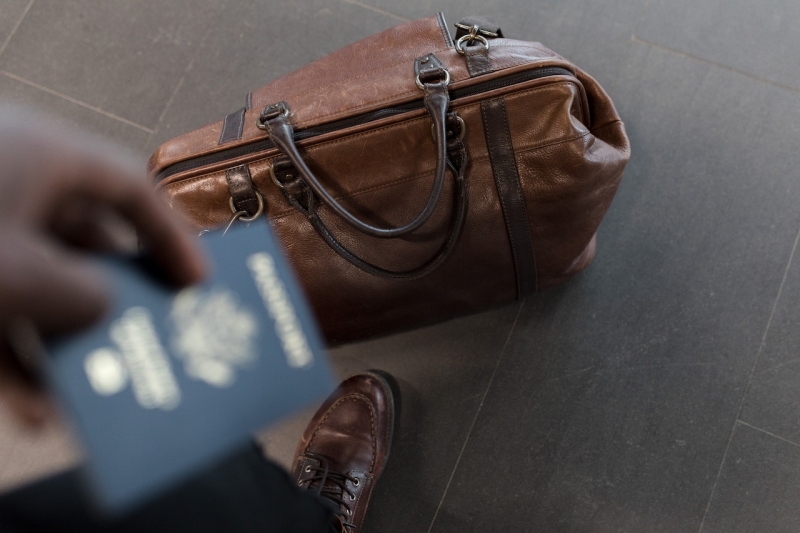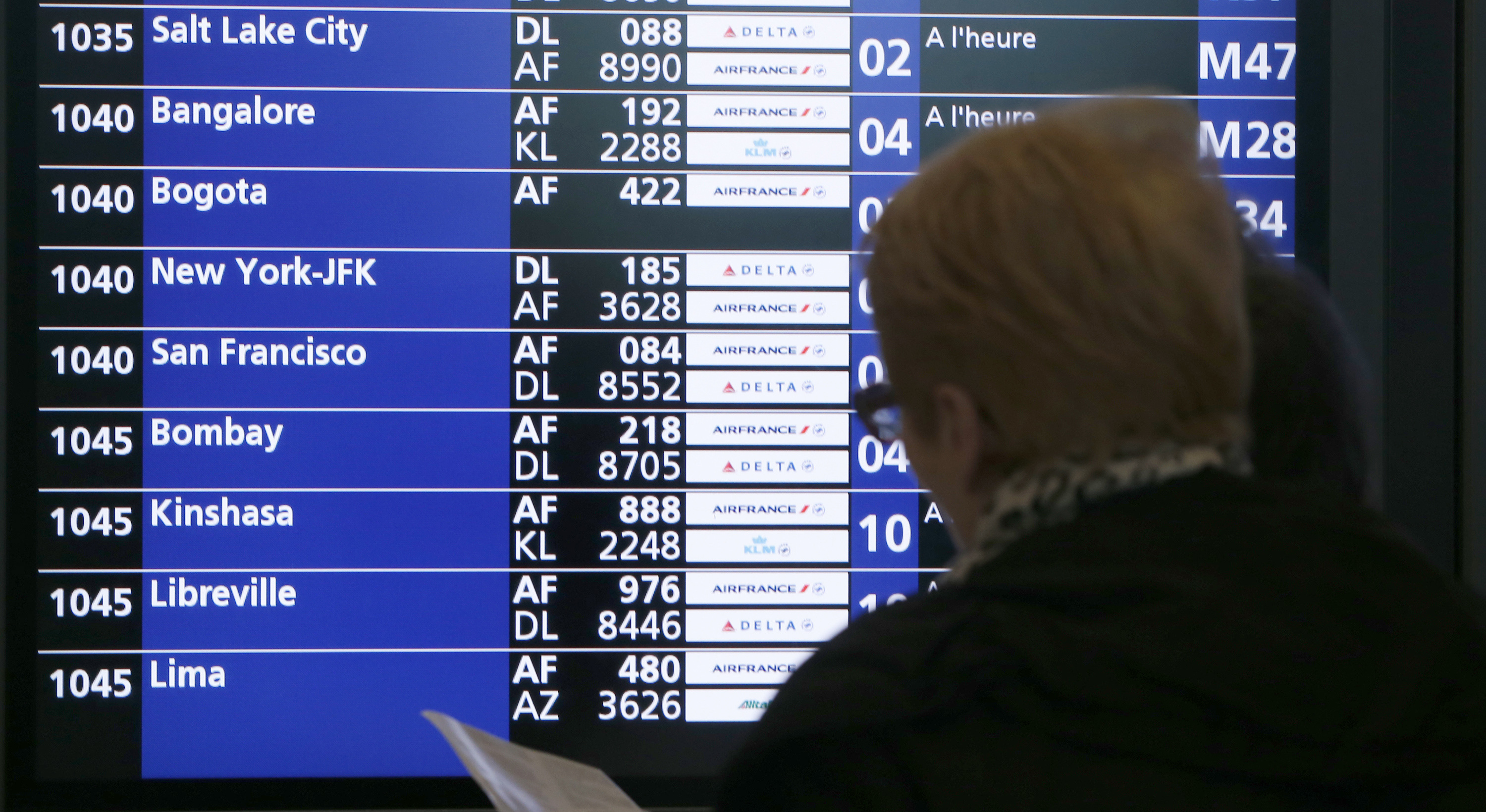- Search Search Please fill out this field.
- Corporate Finance

Corporate Business Travel: Everything You Need to Know
:max_bytes(150000):strip_icc():format(webp)/Headshot-4c571aa3d8044192bcbd7647dd137cf1.jpg)
Katie Miller is a consumer financial services expert. She worked for almost two decades as an executive, leading multi-billion dollar mortgage, credit card, and savings portfolios with operations worldwide and a unique focus on the consumer. Her mortgage expertise was honed post-2008 crisis as she implemented the significant changes resulting from Dodd-Frank required regulations.
Corporate business travel involves the movement of individuals representing their organizations for work-related reasons. Whether it’s attending client meetings, industry conferences, or sealing business deals, this practice covers a range of activities essential for professional growth.
In the interconnected global business environment, where face-to-face connections matter, corporate business travel plays a central role in sustaining and expanding enterprises across borders. Businesses face challenges in optimizing this crucial element of their operations. Strategic considerations must be taken into account to use this element of business to its greatest potential.
Key Takeaways
- Corporate business travel can unlock new opportunities for business growth, offering the possibility of reaching new markets, connecting with a wider pool of prospects, or developing brand presence and reputation.
- Traveling for business has many benefits for individuals as well, providing them the chance to meet fellow employees, grow their career by participating in different opportunities, and network within the industry, not to mention experience new destinations.
- Business traveler safety and security are top priorities during corporate travel.
- To ensure that travel goes smoothly and stays within budget, companies should implement corporate travel policies and best practices for employees traveling on behalf of the company.
Importance of Corporate Business Travel
There are many business-related reasons to travel. It can encourage team building, promote learning, offer different perspectives, provide connection to a wider network, open up new markets, and drive sales. And whether or not the trip is for a specific purpose (such as a conference or a retreat), the benefits for employees and companies alike can extend beyond the stated intent of the trip, building confidence, cultural competency, relationships, and company reputation.
Many employees consider the opportunity to travel for work a desirable job perk, as it can offer the chance to venture somewhere that they may not ordinarily go, or to have a trip paid for by their company. And although expenses are associated with travel from a corporate perspective, they may be well worth the return on investment in terms of potential leads or sales—plus, many travel expenses are tax- deductible .
Types of Corporate Business Travel
Corporate travel can take many forms, including the chance for employees and executives to attend events, such as meetings, conferences, industry networking sessions, and fairs. Or a trip may take advantage of educational opportunities such as training sessions, seminars, and workshops. Retreats and guided trips can make for valuable team-building time in new contexts that unlock different perspectives and strengthen working relationships.
Businesses may send their employees to a different location to network, sell, teach, learn from, or generally connect with external contacts or internal employees in regional offices, or to act on behalf of the company in some way.
Additionally, from a client perspective, business travel may occur as a form of due diligence , ensuring that your vendors or suppliers are legitimate, legal, and compliant organizations—for example, traveling for regular audits to confirm that what you think is happening at your supplier organizations is actually happening.
Creating a Corporate Travel Policy
From a company perspective, travel can be a challenge to administer and manage . Costs can easily balloon out of control; travel logistics can be time-intensive to arrange; employees traveling on behalf of the company must be granted a great deal of trust; and like any form of travel, business travel can open up risks to safety, security, and health.
No matter the size of the business or the frequency or complexity of travel, a corporate travel policy can be a helpful tool for any company to set expectations for its employees, communicate guidelines and processes, keep expenses within budget, and streamline booking and logistics.
In creating a corporate travel policy, companies might consider the following for both domestic and international travel, as applicable:
- Purpose(s) of travel
- Which employees are eligible to travel
- Booking and expense approval processes
- Risks and liabilities of travel and how to manage them
- Expectations for employee behavior, including acceptable and secure uses of technology, personal vs. leisure time, communication, and entertainment while traveling
- Eligible expenses for employees while traveling, including per diem rates if applicable
- Determine if employees will be reimbursed for their expenses or given a corporate credit card to use
- Financial tracking, record-keeping, and reimbursement processes
- Acceptable booking practices and costs, including preferred agents or vendors
- Travel insurance
Of course, policies must also be communicated and enforced to ensure compliance and fairness. Including a travel policy as part of a corporate handbook or reviewing it in an onboarding or training module can be a good way to ensure that all employees receive and understand the information. Making it easily accessible for future reference on a shared drive or company portal will encourage employees to refer to it often.
Business travel managers estimate, on average, that spending on domestic and international corporate travel is at 77% and 74%, respectively, of where it was before the COVID-19 pandemic.
Setting a Corporate Travel Policy
:max_bytes(150000):strip_icc():format(webp)/GettyImages-14013409352-16063b976ed14512837ca0fe8bdc536d.jpg)
Corporate Business Travel Best Practices
There are many best practices that both employees and companies can keep in mind around corporate business travel to ensure that it is a successful experience. These encompass everything from administration and financing to employee behavior and well-being.
Booking Corporate Travel
Booking travel can be labor-intensive and time-consuming. To improve the booking process, save on costs, and streamline expense reporting, it can be helpful to designate preferred travel agencies, online platforms, vendors, and lodgings for employees and executives to book with. If the size of the company allows, it can also be helpful to hire an employee or team specifically to oversee and administer corporate travel, or designate this duty as part of an employee’s broader job description.
Managing Travel Expenses and Budgeting
There are many financial considerations when it comes to corporate business travel, and expenses and budgets must be carefully managed to keep costs under control. Many travel expenses are tax-deductible and can be written off, representing potentially significant savings for a company. Setting a budget and clear guidelines for employees about what can be an expense and what cannot is a must, as is creating and enforcing policies and procedures around tracking and reporting expenses.
Many corporate credit cards offer travel rewards and cost-saving opportunities for business travel, as do many other vendors and suppliers in the corporate travel industry. Businesses can take advantage of these to reduce inefficiencies and save on costs.
How to Manage Corporate Travel
:max_bytes(150000):strip_icc():format(webp)/GettyImages-1447025063-e5cd8140937b4bddb5a1c103997e498e.jpg)
Ensuring Traveler Safety and Security
As with any trip, business trips are not without safety and security risks, including the potential for political or civil unrest, crime, illness, injury, accidents, emergencies, natural disasters, cybersecurity breaches, or theft.
To protect their employees against unexpected and undesirable circumstances, at a minimum, businesses will want to have a travel insurance plan in place. It’s also helpful for businesses and employees to undertake some form of travel risk assessment to aid them in navigating potential risks, and outline safety and emergency preparedness guidelines within a corporate travel policy.
Employees should also know how to call if something goes sideways, such as hotel booking issues. A travel agent? A supervisor? If there’s a hurricane, you don’t have a car, and your flight is canceled, can you book another last-minute flight to get around the weather to get home? These details should be planned ahead for.
Maximizing Productivity During Business Trips
The overlap of business and leisure, sometimes referred to as “bleisure,” is one of the main draws of corporate business travel. However, there can also be pitfalls associated with this gray area. It can be difficult to stay productive while working remotely, whether due to the many distractions of a new environment (positive and negative), or because the trip entails an increased workload or time spent away from day-to-day job duties.
Employees looking to manage their time efficiently while away should get clarity on the intended purpose and expected outcome of their trip, and their employer’s and teammates’ expectations for their workload and communication frequency. They can also plan ahead to make the most of their travel time and downtime, and anticipate time zone differences to ensure smooth communication and adjustment to jet lag.
It’s important for employees to maintain work-life balance while traveling on behalf of work. Researching food, entertainment, and fitness options and preparing accordingly can pay off in terms of mental and physical wellness, especially for frequent travelers.
Tips for Business Travel Etiquette
Traveling anywhere, whether domestically or internationally, comes with responsibilities and expectations regarding employee behavior. Perception is one of the most important factors to remember when traveling as a representative of your company. You represent your company out in the public, so you need to ensure you’re displaying any key values that your company represents when interacting with vendors, clients, and peers.
This applies to cultural sensitivity as well. Travelers should do research in advance of their trip to ensure that they can be mindful of local customs and professional etiquette and behave with awareness and respect. Even the basics, such as learning appropriate forms of greeting or how to handle money and payment, and committing a few common words or phrases to memory can go a long way toward demonstrating good intentions and building a new relationship across cultures.
Sustainable and Responsible Business Travel
Recognizing that corporate travel can have a negative impact on the environment, many businesses and individuals are reexamining their travel practices and policies to see where they can make improvements. One example is reducing emissions by booking different means of transportation when possible. In general, seeking out vendors or companies that promote sustainable travel practices and responsible tourism, and that support local communities and ecosystems, can be a good first step to reduce environmental impact.
Technology and Tools for Corporate Business Travel
Software and technology tools can be immensely useful across all aspects of corporate business travel. Travel management and booking platforms; apps for tracking expenses, navigation, or converting currency; and translation and communication tools are all things that employees and businesses alike can take advantage of before, during, and after traveling.
When it comes to technology, it’s important to account for cybersecurity risks and only bring what is necessary to reduce the potential impact of damage, loss, or theft.
Managing Business Travel Expenses
:max_bytes(150000):strip_icc():format(webp)/GettyImages-652153847-592422645f9b58f4c07fcb7a.jpg)
What Is an Example of Corporate Business Travel?
There are many work-related reasons to travel, but many businesses will have their employees travel for conferences, events, sales and networking, seminars, meetings, team building, retreats, and to open up new business growth potential.
How Does Corporate Business Travel Work?
Corporate travel is simply travel for business-related purposes, so the nature of the trip will depend on its length and purpose. Companies whose employees travel frequently on behalf of the business should consider creating a corporate travel policy with information and guidelines for their employees.
Who Handles Corporate Business Travel?
Some businesses employ internal teams or individuals to manage corporate travel and business trips. At other times, employees are responsible for making their own arrangements within guidelines laid out by the company. There are also corporate travel agencies that businesses can leverage to streamline and optimize their bookings and costs.
The Bottom Line
Corporate business travel can be an invaluable path to both business growth and individual career development, building strong relationships and teams. No matter what form it takes, it’s prudent for companies to collect, implement, and communicate best practices for business travel to their employees in a company handbook or corporate travel policy. This should incorporate areas such as expense and booking management, safety and security, productivity, sustainability, technology, and employee behavior and etiquette.
Michela Buttignol / Investopedia
Internal Revenue Service. “ Understanding Business Travel Deductions .”
Global Business Travel Association. “ GBTA Business Travel Industry Outlook Poll .”
Harvard Business Review. “ How to Work and Travel at the Same Time .”
- Terms of Service
- Editorial Policy
- Privacy Policy
- Your Privacy Choices
Business Travel: The Beginner’s Guide
June 12, 2019
by Rob Browne

In a world where it has become as easy as a quick few taps on smartphone to book a trip across the world, business travel is more widespread and accessible than ever before.
Are you a recent graduate or new employee looking for an introduction to business travel? This article provides an overview of the field as a whole as well as a guide to traveling for work and managing your business travel expenses .
What is business travel? A step-by-step business trip guide
Research from Statista shows that business travel contributes almost $1.3 trillion to the global economy in a single year, making it one of the world’s largest economic industries. Further research highlights only upward trends in the amount that is spent on business travel as well.
This research reflects an increasingly intertwined global economy. With the speed at which businesses on opposite sides of the world can interact over the internet and travel to meet with each other, employees are operating in a space where location is fluid and business interests can converge across state, national, and continental lines.
Thus, business travel is a vital part of many companies’ lifebloods. In this article, we’ll explore the four temporal components of a business trip and use them as a lens through which to discuss business travel.
Booking business travel
Oftentimes, the dates and general logistics of your business trip are determined by the wants and needs of the client(s) you visit on the trip. If possible, it’s always best to book as far in advance as you can to plan on being out of office. Of course this won’t always be the case, as business trips occasionally arise on short notice if a client needs a quick turnaround time on a particular task that requires a visit.
Booking a business trip is not the same as browsing the internet for the best deals on a family vacation . The online booking platform (OBT) that you use for securing your transportation and hotel depends on your company’s internal travel policy.
Some companies require their employees to book through a specific brand of travel management software or using a travel management company . A key motivator for companies to use travel management software is that it makes it easier to ensure that employees comply with corporate travel policies. These policies include which airfare class employees are allowed to book, which hotel star class they can stay in, and the class of rental car they can use.
For others, booking your business trip may be a similar experience to booking a trip outside of work, as some companies tolerate open market bookings.
The rigidity with which you’ll be dealing with in terms of booking compliance is dependent upon your company’s travel policy and budget. In most cases, you’ll be looking at a range of mid-tier flight and hotel options that best fit your needs in terms of schedule and distance from the site where you’ll conduct most of your business.
Preparing for the trip
Business trips are often short and have a singular purpose. Get to your destination, meet with the people you need to meet with, and go home. Because of the high energy level required for such a focused itinerary, you’ll want to make sure that you are well-rested going into the trip.
After arriving at your destination, there may not be time to catch a nap before heading to your first meeting, so you’ll want to ensure that you are able to operate at peak performance as soon as you arrive.
Travel with your important items in your carry-on bag just in case anything happens to your checked luggage. Almost everything you bring on a business trip should be essential to your work, and with a short turnaround between arrival and meetings, you can’t risk not having item X, Y, Z..
On the trip
While on your trip, optimize for everything you can. Outside of any business-related commitments, you’ll want to make sure you have as much time as you need for your work. If there is a particular company policy regarding a daily per diem, or allowance, for meals or transportation, you’ll also need to keep that in mind.
If your trip is to a destination with a lot to see outside business hours or a place where you have friends or family, you can also check with your company’s travel policy regarding bleisure travel. Bleisure, a combination of “business” and “leisure,” means adding a few days onto the beginning or end of your trip to enjoy the opportunity to spend some time not only inside an office.
After the trip
The most important part of finishing a business trip is gathering your expenses and filing an expense report. Between flights, hotels, other transportation, and food, you likely spend a decent amount of money and would like your expenses to be approved and reimbursed as quickly as possible.
Having your expenses approved and reimbursed is typically an easy process, especially if your company uses a form of expense management software .

It’s a trip!
Traveling for work may seem daunting, but thinking about your trip in terms of these four segments will help you succeed at all points of your trip. If your job allows you the opportunity to spend time outside of your office, enjoy it—and maybe spend time in some exciting destinations along the way.

Rob is a former content associate at G2. Originally from New Jersey, he previously worked at an NYC-based business travel startup. (he/him/his)
Recommended Articles

Small Business Finance Guide for Beginners
Alright. You started your small business and everything seems to be going pretty well.
by Mary Clare Novak

Contributor Network
How to Use Process Automation to Boost Your Small Business
If you own a small business, you know how difficult it is to get everything up and running...
by Ashley Spencer

Demystifying the 7 Best Small Business Checking Accounts
Keeping your work and life separate is one of the most essential elements of starting your own...
by Piper Thomson
Never miss a post.
Subscribe to keep your fingers on the tech pulse.
By submitting this form, you are agreeing to receive marketing communications from G2.
- Sustainability
- Small Business
Reimagining business travel, without all the baggage

Since travel came to a screeching halt in March 2020, many have predicted that business travel might never recover, given the advances of video conferencing and the embrace of work from home policies.

But global business travel spending is expected to surpass 2019 levels this year, according to the Global Business Travel Association’s Business Travel Index released in August — that's two years sooner than GBTA was forecasting the previous year. A Mastercard survey of travel decision-makers , also released in August, found that nine out of 10 believe business travel is still critical for driving growth, and more than half expect to spend more than $1 billion on travel in 2025, up from 11% pre-pandemic.
That’s music to the ears of airlines and convention hotels, but technological advances, changing expectations and new pressures have also altered the business travel landscape in ways that may ease the journey for road warriors and frequent flyers – and the corporate teams who manage their travel. Here are five trends shaping business travel in 2024.
01 'Bleisure' is here to stay
Remote work is here to stay, and some companies have even instituted “work from anywhere” benefits, giving employees the opportunity to stretch out vacations abroad or visits to family. It also means corporate travelers can extend business trips by a few days, giving them a chance to explore more than just the convention hall or hotel amenities. The days of two-day international business trips may soon be in the rear-view mirror, as employees enjoy the perks of flexible office policies. But a distributed workforce can create new challenges when it comes to monitoring spending — a person working from home might have different expenses than a traditional office worker, like buying subscriptions, office furniture and computer equipment, which can make it more difficult for companies to predict and account for spending.
02 Business travel, consumer experience
For companies, combining business and travel is not always smooth sailing — managing expenses and reimbursements can get complicated. And for employees, the ease of paying with a tap or a click in their daily lives is missing from travel and entertainment payments, as anyone who labored over an expense report can attest. That’s why many companies are moving to virtual cards for travel expenses. These cards are created instantly for specific purposes — a business trip, a client dinner at a conference, travel arrangements for a promising recruit — with customized spend controls, such as the amount, time period and type of purchase where the cards can be used, producing detailed data for tracking, reporting and automated reconciliation. They can even be issued directly to mobile wallets, creating contactless travel experiences.
These heightened consumer expectations could also make companies expand the benefits on their commercial and corporate T&E cards — better travel insurance, concierge support, telemedicine offerings and access to airport lounges, for example.
03 AI at your service
Another extension of the “consumerization” of business travel? The AI tools taking hold in the leisure travel sector, including virtual travel agents that can customize itineraries and lock in low fares, are likely to make waves in corporate travel as well. These bots can tailor travel based on T&E policy, budget and employee preferences. And with the cost of business travel rising – CWT’s Global Business Travel Forecast for 2024 shows a 3% rise in average cost per attendee per day for meetings and events, and a 3.6% increase in hotel rates — corporate travel teams can use AI for better price predictions, more proactively managing their budgets. It can also help these teams build more dynamic policies and even adjust spending limits by analyzing past spend on a much more granular level. AI tools can simplify the arduous expense report process for both employees and finance teams by automating the capture and review of repetitive and predictable expenses. Nine in 10 travel decision-makers plan on investing in AI and machine learning to improve processes and personalize travel for their employees, according to the Mastercard survey.
04 Tracking the impact of travel
Many corporations are making concerted efforts to lower their carbon footprint. Nine in 10 travel decision-makers in Mastercard’s survey said they are more focused on tracking environmental, social and governance efforts — greenhouse gas emissions from company travel, for example. Carbon emissions tracking tools that show carbon footprint of business trips and seat selections can drive more environmentally conscious travel decisions. With sustainability at the top of corporate agendas, we can expect companies to seek out ways to help them achieve their sustainability goals. Mastercard’s T&E Consulting Services, for example, helps corporations re-evaluate their T&E policies and procedures, assess supplier performance and improve for the future.
05 The rise of the chief travel officer
At many organizations, the responsibility for corporate travel is split between human resources, finance, procurement, technology and even security teams. Even if they’re using the same tools and platforms, there’s often a disconnect when it comes to long-term strategy and decision-making. As business travel becomes more automated, larger companies may benefit from a chief travel officer — someone who can work across the organization to streamline processes, discover efficiencies and make the most of these emerging tools, enterprise solutions and corporate card benefits, including travel risk management services, concierge support and telemedicine offerings.
The resurgence of business travel illustrates the enduring value of in-person interactions — the building of relationships, the sparking of innovation, the deepening of trust that comes from sitting across the table or sharing a meal. Technology may have enabled the rise of virtual work, but technology is also making business travel smarter and more seamless than ever before.
This month, the Mastercard Newsroom is exploring how rapidly evolving technology, heightened consumer expectations and economic and societal pressures are changing how we live, work, shop and innovate.

In-car payments
Development finance
Data for good
Business travel
Authentication
Personalization

- Perspectives
- The future of business travel
- Investor Relations
Mastercard Sites
- Mastercard.com
- Mastercard Brand Center
- Mastercard Data & Services
- Priceless.com
See how Cvent can solve your biggest event challenges. Watch a 30-minute demo.

What Is Business Travel? Importance and Types

Business travel has always been an integral part of the corporate world. It provides opportunities to meet clients face-to-face, attend conferences and networking events, and explore new markets.
However, as much as business travel can be exciting, it also comes with its fair share of challenges. From flight delays and cancellations to tracking approvals and keeping spending in check, numerous obstacles can make business travel stressful and overwhelming.
In this blog, we will explore the challenges and solutions of business travel and provide insights on how businesses can optimize their policies and practices to make them more efficient, cost-effective, and enjoyable for everyone involved.

What is Business Travel?
Millions of professionals worldwide engage in business travel each year. Business travel is when you hit the road or take to the skies for work-related purposes. So, if you've ever traveled across state lines for a meeting or hopped on a plane for a conference, you've been on a business trip.
According to the Bureau of Transportation Statistics , Americans take over 400 million long-distance business trips yearly, accounting for roughly 16% of all long-distance travel.
What is the Importance of Business Travel?
It's clear that business travel is a significant part of many companies' operations, but what motivates them to send their employees on these journeys? There are several reasons why companies invest in business travel. Here are some of them:
1. Closing Deals
Business deals often involve significant negotiation, and in-person meetings can be critical to reaching an agreement. When people meet in person, they can build trust and establish personal connections that are difficult to achieve through virtual communication. As such, closing deals in person is a common reason for business travel.
2. Exploring New Markets
Companies looking to expand into new markets often send representatives to explore the conditions on the ground and conduct research. Visiting a new market can provide valuable insights into consumer behavior, local regulations, and cultural norms that can help companies tailor their products and services to a new audience.
3. Building Relationships
One of the primary advantages of business travel is its opportunity to build stronger relationships with clients, partners, and colleagues. While email, phone, and video conferencing are convenient, nothing beats face-to-face interactions regarding establishing trust and rapport.
You can pick up on nonverbal cues during in-person meetings and establish a more personal connection. It can lead to a deeper understanding of the other person's needs and goals, which can ultimately help you provide better service or products. Additionally, in-person meetings can help address any concerns or issues more quickly and efficiently, preventing them from becoming more significant problems down the line.
4. Networking
Attending industry events, trade shows, and conferences can provide networking opportunities, learning about new trends, and meeting potential clients and partners.
Networking can be invaluable for building relationships, finding new clients or partners, and staying up-to-date with industry best practices. For example, attending a trade show can provide opportunities to showcase your products or services, meet potential clients, and learn about the latest market trends.
5. Competitive Advantage
Companies prioritizing business travel and investing in face-to-face meetings with clients and partners can gain a competitive advantage over those relying solely on digital communication. By meeting with clients and partners in person, companies can establish more personal connections and build trust, leading to more business opportunities and revenue.
Here's a business travel checklist to make business travel for your employees less stressful.

Different Types of Business Travel
Business travel can take many forms, depending on the purpose of the trip and the activities involved. Here are some of the most common types of business travel:
- Event and Conference Travel: Companies often send employees to corporate events and conferences where attendees can learn and network with peers, potential clients, and service providers.
- Training and Education: Companies may send employees to conferences and workshops to learn about trends and best practices in their functional areas. These events can provide valuable opportunities for professional development and networking, helping employees stay up-to-date on the latest industry developments and build relationships with others in their field.
- Internal Meetings and Visiting Offices: National and multinational companies may need to send employees and leadership to other offices to discuss specific projects and business strategies or to build a more integrated organizational culture.
- Company Retreats: Some companies hold retreats annually or multiple times yearly to help teams grow stronger and build company culture through shared activities.
- Client Meetings: Maintaining solid relationships with existing clients is crucial for many businesses. Account managers and others may regularly visit their most prominent clients to check in on them, take them out for a meal or drink, and generally show gratitude for their business. These visits can strengthen relationships and potentially lead to additional business.
- Trade Fairs: Many organizations attend trade shows and expos to display their products and services and connect with potential clients. Attending these events can effectively generate leads and build relationships with potential customers, especially in industries where face-to-face interactions are critical.
- Transfers and Offshore Work: Long-term transfers involve relocating employees to a different city or country for a certain period, usually to work on a specific project or set up a new function or business process.
- Transient Travel: Business transient travelers typically refer to individuals who frequently travel for short periods, often for a business meeting or work-related. These travelers usually stay in hotels or temporary accommodations and frequently move between locations for work or other activities.
- Bleisure Travel: This hybrid travel style combines business and leisure travel, allowing employees to extend their business trips to leave time for sightseeing and relaxation. Bleisure travel can benefit employers and employees, encouraging employees to volunteer for business trips more often and providing a relaxing break.
Top Challenges To Manage Business Travel
As many businesses need help managing company travel, several issues affect day-to-day operations. These include:
1. Managing Large Numbers of Requests
When managing large numbers of travel requests, keeping track of all the information and ensuring that requests are processed efficiently can be challenging. It can result in delays and frustration for employees waiting for travel approvals or information.
For example, imagine a small company with just one finance person responsible for managing all travel requests. They receive requests from various team members in different formats—email, Slack messages, and in-person visits. It can lead to confusion and delays in processing the requests and distract the finance person from other essential tasks.
2. Tracking Approvals
It's a massive headache if your company's travel approvals are manually emailed. Tracking travel approvals can be time-consuming and prone to errors. It can result in missed approvals, delayed travel, and frustration for employees waiting for approval.
Imagine a team member submits a travel request, and the finance person then sends an email to the manager for approval. If the manager is busy or forgets to respond, the request may be delayed or even missed altogether, causing frustration for the employee who is scheduled to travel.
3. Keeping Spending in Check
Managing travel costs can be difficult, especially when employees book trips independently or through different channels. It can result in overspending and frustration for finance teams who aim to keep costs under control.
For example, imagine a company where employees book travel through different channels. Some employees book expensive hotels and flights, while others find cheaper options on discount travel websites. It can lead to inconsistency in travel costs and make it difficult for the finance team to manage and budget travel expenses.

4. Being Flexible
Flexible travel policies can result in consistency, especially when balancing cost control with employee satisfaction. It can result in frustration for both employees and finance teams.
For example, a business with restrictive travel policies can limit employees to specific airlines, hotels, and routes. It may help control costs, restrict employee options, and make travel less enjoyable. On the other hand, if policies are flexible, employees may book expensive options outside the budget.
5. Reducing Errors
Reducing errors in travel management can be challenging, but it is essential to ensure accurate tracking of expenses and approvals. This can help prevent delays and frustration for employees and finance teams.

How Companies Can Manage Business Travel
Companies must make the process straightforward to ensure that team members comply with travel policies. If the process is simple, team members will find ways to circumvent the rules, and compliance will improve. The following are some common pitfalls to avoid:
- Too many rules: Too many, incredibly confusing or contradictory, can be overwhelming and frustrating for team members. It can lead to non-compliance or errors.
- A high number of touches: Too many touchpoints, like requiring additional emails to managers for approval, can slow down the process and make it difficult.
- Lots of manual steps: Requiring team members to file printed documents and receipts can be time-consuming and create opportunities for errors.
- Unclear processes: If team members are unsure of the steps or rules they must follow, they may become frustrated and disengage from the process.
To ensure compliance and simplify the process, use a corporate travel management system that walks employees through each step. By automating the process and making it easy and intuitive, team members are more likely to follow the rules and comply with company policies.
What is a Business Travel Solution?
A travel management system is a software platform that helps companies manage their employees' travel-related activities and expenses. These systems can be purpose-built tools from third parties or developed in-house by large companies. However, building a travel management system from scratch doesn't make sense with the availability of business travel management tools out of the box for a relatively low cost.
These systems aim to oversee, regulate, and coordinate a company's employees' travel activities and expenses. Previously, a company's office administrators or a dedicated travel manager would handle these tasks. However, with a travel management system, these manual tasks can be streamlined or automated, freeing up staff for more valuable work than monitoring others' travel plans.
A business travel solution typically offers features such as online booking, expense tracking, policy compliance, travel budgeting, and reporting. They make booking, managing, and tracking business travel much simpler and more efficient for companies and their employees.
As a business, it's essential to recognize the value of investing in business travel. There are numerous reasons why companies send their employees on these trips, including closing deals, exploring new markets, holding internal meetings, prospecting, educating, and visiting existing clients. These opportunities provide valuable experiences and insights to enhance your company's operations and bottom line.
However, managing business travel can present challenges, such as managing large requests, tracking approvals, and dealing with changes in travel plans. To address these challenges, it's crucial to have a straightforward and streamlined travel policy outlining the process for requesting, approving, and booking travel and any expense and reimbursement policies.
Another essential aspect of managing business travel is providing support and resources to employees while on the road. It includes ensuring they have the necessary technology and tools to stay connected and productive, providing guidance on safety and security, and offering access to travel support services in emergencies.
By recognizing the importance of business travel and implementing strategies to manage it effectively, your company can reap the benefits of enhanced collaboration, improved relationships with clients and partners, and increased opportunities for growth and success.
So let your employees stay connected, build relationships and enjoy their next business trip!

John Hunter
John is the Senior Manager of Event Cloud Content Marketing at Cvent. He has 11 years of experience writing about the meetings and events industry. John also has extensive copywriting experience across diverse industries, including broadcast television, retail advertising, associations, higher education, and corporate PR.

More Reading
Live event streaming: best practices and steps to success, the discovery of a lifetime – atlantis bahamas, kempinski hotel cancun: the premier fusion of business innovation and leisure.
Subscribe to our newsletter

- Travel management Toggle submenu Egencia Overview Travel management solutions Amex GBT Neo1 Amex GBT Select Amex GBT Ovation Amex GBT Lawyers Travel Manage your corporate travel program Corporate travel policy Travel risk management Travel expense management Reporting Travel management consulting Industry Solutions Transportation & Logistics
Egencia reviews

See how Egencia works

- Customer center Toggle submenu Travelers Help center Business traveler center Download the app Travel arrangers Help center Travel arranger center Training resources Travel managers Connect community Product updates Customer training
- Watch a demo
- Request a demo
- About Egencia
International Business Travel, Management of Global Business Travel
International business travel.

For many businesses across the United States, commerce is a global activity and with an international economy comes the challenge of doing businesses in other countries around the world.
Global travel is not without its risk and the coronavirus pandemic has shown that from a business perspective, organizing travel and ensuring the safety of your staff has raised a whole new set of challenges and issues, many of which not all businesses were prepared for.
As global business travel starts to increase again, both employees and businesses are looking at ways that they can still travel internationally for business, whilst maintaining safety and ensuring that any fast-moving changes and situations are managed effectively and easily without incurring the cost of having to rebook or cancel at short notice.
International Business Travel Risks
When it comes to traveling internationally for business, just like with leisure travel, it isn't without some potential risk. While the majority of business travel is carried out without a hitch it's always a good idea to be prepared for the worst.
Some of the travel risks that travelers need to watch out for include staying safe in unfamiliar locations, keeping travel documents secure and maintaining health, which has become paramount in recent times.
Other risks that affect international business travel are last minute changes to a person's schedule, such as cancellations and problems with bookings. Modern business travelers need to have a set of dynamic policies and tools they can rely on to ensure that they can quickly adapt to any challenges that arise.
The good news is, there are plenty of things a business can do to insulate itself from issues with international travel and to help maintain the health and safety of their employees when traveling on behalf of their organization.
One of the key improvements a business can make to their business travel program to help mitigate the majority of these potential travel problems is to use an effective travel policy .
How International Business Travelers Can Protect Themselves
When traveling abroad it's always a good idea to have a travel insurance policy to cover potential issues. As a business traveler, your personal travel insurance policy might cover you for business trips, but it's worth double-checking the policy with your provider prior to travel to avoid expensive mistakes. The company you work for might also cover you under a business travel insurance scheme, but you should again check with your employer to find out what is, and what isn't covered. For example, it's never advisable to travel without a health care policy in case of illness or accident.
It's also a good idea to familiarize yourself with the location of the nearest U.S. embassies so that if the worst happens and you lose important documents like your passport, you'll know where to go to resolve the issue.
Although employees may take a pragmatic approach to traveling safety, employers have a duty of care to their personnel, which means as a company you might be looking at ways to keep your employees safe when they're out traveling for your business. Ultimately, the best way this can be achieved is by implementing a comprehensive travel risk management program and by creating travel policies to maintain travel compliance and ensure traveler safety.
Coronavirus Pandemic's Impact on Global Corporate Travel
Over the last few years, the Covid-19 pandemic has caused huge problems traveling internationally. Even at a domestic level, the road warriors who travel around visiting customers and businesses across the U.S. have found that state to state, U.S. travel still has its own unique restrictions and challenges to deal with.
For business travelers looking to travel to a foreign country in many locations, travel restrictions have been put in place to stop unnecessary travel. As the coronavirus vaccine has been rolled out, some of these travel restrictions have started to lift and travel plans are starting to be made again.
When it comes to international business travel, it's always a good idea to check the status of the country that you're going to, so you can ensure that you can travel by meeting any restrictions that are in place. The Egencia ® Travel Advisor tool can quickly and easily identify issues in various locations around the world. In addition, you can find travel advisories for trips during COVID-19, including regulations for destinations, and safety and health guidelines.
Benefits of International Business Travel
Even though business travel has reduced over the last few years, and with the targets to reduce carbon emissions, many businesses are looking at ways to reduce expensive (and emission producing) business trips where possible. However, while some business meetings can be held via video conferencing services, it can be difficult or impossible to carry out some business functions virtually. Often, you just have to be there!
There are a number of benefits of face-to-face meetings with colleagues or clients, and these include:
Being able to read body language. It can be difficult to pick up on the non-verbal cues when speaking virtually. Humans have the ability to pick up on subtle micro expressions that people give off, and adapt accordingly. This can help with competitiveness and closing deals that might otherwise be lost if those micro expressions are not picked up on - which is hard to do virtually!
Building relationships. Many customers prefer face-to-face meetings as business often isn't just about what you can offer as an organization but also about relationships and finding people and corporate philosophies that are in synergy together. This is much easier to do in person, where small talk and more natural interactions can occur between people and teams.
Improve focus and concentration. When in a face-to-face meeting you tend to have the full attention of the people that you are speaking to. When on a video call, you might find that people in the meeting aren't paying as much attention. They could be looking at social media, answering emails and not being fully engaged. In a face-to-face meeting the likelihood of this happening is significantly reduced.
Easier to deal with different time zones. International business can take place across lots of different time zones. When trying to organize a call or video meeting, it can mean that someone somewhere, will have to accommodate an out-of-hours calendar invite that might come at a very inconvenient time. For global organizations this can mean that someone will have to have a call or meeting very early in the morning, or very late at night. This can reduce productivity and effectiveness if people are tired. This can also mean that people are keener to get the meeting over and done with faster, so meetings can be rushed.
A face-to-face meeting means time zones won't matter because everyone will be one the same schedule. Of course, an international flight can introduce the dreaded jet lag, but this can be compensated for by proper scheduling of the flight and adequate rest.
For the individual business traveler, there are also benefits to be had from traveling internationally. For instance, it can make a job more interesting and engaging as you get to explore and see new cultures and locations.
International travel can make a job more varied, as you'll often experience new things, activities and meeting new people. For many employees this is the sort of thing they look for in a role, and it can make for a happier employee. When the employee is restricted to a conference phone call or video meeting, often from their own homes or satellite office, the day-to-day can become boring. International travel is a way to keep employees engaged, happy and most importantly efficient and effective.
With the ability to use laptops and mobile computing devices when traveling and when using air travel, there's a lot less employee downtime, so in many cases an employee can still carry out work when on a long-haul flight.
International Business Travel Management
Some companies leave the booking of international travel to the employees to handle, but this is not always the best use of their time, nor is it the most cost-effective way to travel.
That's why many companies use a travel management company such as Egencia to simplify and streamline business travel. Egencia help businesses manage travel risk and help to ensure traveler wellbeing no matter where they travel to. Egencia's travel management solutions also help support your business and plan for the future.
You can set up travel policies for your employees and you can keep in contact with your team globally to keep them informed and ensure their safety when out on business using our travel risk management tools and services.
Future of International Business Travel
When it comes to international business trips, the future holds interesting challenges for travel managers. The coronavirus pandemic has shown that a dynamic approach to business travel is needed. This can be hard to maintain when managing your own business travel program. This is why many companies turn to Egencia to help support their business travel program.
In addition to the need for more dynamic business travel solutions , many organizations are looking for ways to reduce their carbon impact on the environment and areas such as business travel, and especially international business travel are under the spotlight as this is an area where savings can be made. This is where Egencia's travel policy solutions can help, from ensuring only direct flights are booked, but also by ensuring travel options that are environmentally friendly are used more often.
So, whether you're looking for dynamic business travel solutions, need help setting up travel policies for your employees, or want to reduce your carbon footprint, we can help you fine tune your International travel. Visit Egencia.com to find out how we can make your global travel run smoothly.
Looking for better business travel solutions? Get in touch with us.
Recommended for you.

Service unavailable in your location
Unfortunately Booking.com for Business is currently not offering its services in your location
More From Forbes
The rising dark side of business travel ceos need to pay attention to.
- Share to Facebook
- Share to Twitter
- Share to Linkedin
It's time for companies to rethink their approach to business travel.
The business landscape has rapidly changed since the pandemic, with remote work and hybrid models becoming more prominent. Despite these workforce shifts, one aspect remains constant: business travel.
Business travel is back in full force following an expected dip during the pandemic. Corporate travel budgets are returning to pre-pandemic levels, and more companies are planning budget expansions. A Morgan Stanley survey revealed that over two-thirds of companies with under $1 billion in annual revenue anticipated increased travel budgets in the coming year.
The Impact of Frequently Flying
Frequent travel can significantly impact an individual's physical, emotional, and mental well-being . While companies prioritize conventional risk management areas, they often overlook the personal well-being of their travelers. From maintaining a healthy diet to proper sleep and various emotional components such as loneliness and separation, business travelers encounter numerous potential long-term health disruptions that non-traveling employees don't face.
Business travelers had higher claims than non-travelers for all health conditions across the board, along with a higher likelihood of stress-related disorders, as reported in the Harvard Business Review . Lastly, as shared in the Journal of Occupational and Environmental Medicine , frequent business travel adversely affects overall body composition, leading to risks of obesity and various other ailments if left unmanaged, such as heart disease and diabetes.
More and more companies are prioritizing workplace wellness due to factors such as obesity's $400 billion impact on companies . Corporate travel wellness programs are a necessary part of the equation as well. As you look to implement a modern and more robust travel wellness program, start with these two areas:
‘Baby Reindeer’ Star Says Real Martha Searches Need To Stop
Challengers reviews does zendaya tennis movie score with critics, patriots select north carolina quarterback drake maye with no 3 pick in nfl draft, embrace bleisure travel.
When attracting and retaining the best people, more and more employees choose lifestyle over salary . It's not out of laziness. It's out of a desire for work-life integration. With this in mind, organizations can embrace employees' desires through bleisure . Organizations can promote work-life integration and rejuvenation by allowing employees to combine business trips with leisure activities.
Implementing flexible travel policies that enable team members to extend their trips on the back end is a way to improve employee satisfaction, productivity, and retention rates. Research shows that 89% of business travelers wanted to add a private holiday to their business trips. Traveling for work is energetically demanding, physically and mentally. A few extra days for leisure allow team members to process their trip, recharge, and return at total capacity.
Treat Your Employees Like Athletes
Just as professional athletes require careful management of their physical, emotional, and mental well-being , so do business travelers. Business travel is a stressor with a high burnout rate and decreased performance across the board. As you revamp your corporate wellness travel program, consider your approach to business travel as a sports team thinks of traveling to play an away game.
As you prepare the company playbook for healthier and more productive business traveling, consider the following:
- Providing support for handling jet lag
- Offering advice on maintaining healthy sleep and nutritional habits away from home
- Investing in business class and non-stop flights
- Providing hotels that have conducive amenities for optimal well-being
- Ensuring team members reside in centrally located hotels or apartment hotels
Business travel isn't going anywhere anytime soon, as the average business traveler takes roughly 6.8 trips per year, with business travel in the U.S. from domestic and international travelers also accounting for $387 billion in annual revenue, according to research shared over at Zippia . Incorporating travel wellness initiatives isn't merely an expense; it's an investment in employees' health and performance.
As organizations revamp their corporate travel programs, prioritizing their travelers' well-being is paramount. By implementing strategies to support travel wellness, companies can ensure that their employees remain healthy, engaged, and effective representatives of their companies.

- Editorial Standards
- Reprints & Permissions

Pick the plan that takes your company places .
KAYAK for Business
Thrifty travel for small companies and solo business travelers looking to maximize their miles.
Biz+ Coming soon
$20 flat fee per trip
One-stop shop booking and oversight for midsize companies and scale ups. No subscription needed.
Custom pricing
Comprehensive travel management for large corporations with bespoke requirements.
Not sure which plan is right for your business? We can help. Contact us

- Go to 1 testimonial
- Go to 2 testimonial
- Go to 3 testimonial

- Set up policy and approval flows in minutes and keep on top of travel spend
- Integrate tools like Slack and Expensify to make your company travel even easier
- Use the award-winning KAYAK app for on-the-go booking and itinerary changes

- Manage last-minute bookings and travel disruption with 24/7 agent support
- Access advanced booking options like booking for colleagues and guests
- Enhance duty of care and track travel metrics with enhanced reporting

- Eliminate expense reports by booking via project code with supplier direct billing
- Get real-time data visibility with next generation ERP-integrated reporting
- Benefit from dedicated account management to help maximize your travel program
Detailed comparison
- No subscription
- No commitment
* Trips can include multiple bookings like flight and hotel. The fee is included in the final price but charged as a separate transaction for easier expense tracking.
Frequently Asked Questions
Top International Flight Routes .
Cheap flights, hotels , rental cars and travel deals:
KAYAK searches hundreds of other travel sites at once to find the best deals on airline tickets, cheap hotels, cheap cruises, vacations and rental cars.
Not what you’re looking for? Find thousands of other hotels , flights , car rentals and trains and buses with KAYAK.
An official website of the United States Government
- Kreyòl ayisyen
- Search Toggle search Search Include Historical Content - Any - No Include Historical Content - Any - No Search
- Menu Toggle menu
- INFORMATION FOR…
- Individuals
- Business & Self Employed
- Charities and Nonprofits
- International Taxpayers
- Federal State and Local Governments
- Indian Tribal Governments
- Tax Exempt Bonds
- FILING FOR INDIVIDUALS
- How to File
- When to File
- Where to File
- Update Your Information
- Get Your Tax Record
- Apply for an Employer ID Number (EIN)
- Check Your Amended Return Status
- Get an Identity Protection PIN (IP PIN)
- File Your Taxes for Free
- Bank Account (Direct Pay)
- Payment Plan (Installment Agreement)
- Electronic Federal Tax Payment System (EFTPS)
- Your Online Account
- Tax Withholding Estimator
- Estimated Taxes
- Where's My Refund
- What to Expect
- Direct Deposit
- Reduced Refunds
- Amend Return
Credits & Deductions
- INFORMATION FOR...
- Businesses & Self-Employed
- Earned Income Credit (EITC)
- Child Tax Credit
- Clean Energy and Vehicle Credits
- Standard Deduction
- Retirement Plans
Forms & Instructions
- POPULAR FORMS & INSTRUCTIONS
- Form 1040 Instructions
- Form 4506-T
- POPULAR FOR TAX PROS
- Form 1040-X
- Circular 230
Understanding business travel deductions
More in news.
- Topics in the News
- News Releases
- Multimedia Center
- Tax Relief in Disaster Situations
- Inflation Reduction Act
- Taxpayer First Act
- Tax Scams/Consumer Alerts
- The Tax Gap
- Fact Sheets
- IRS Tax Tips
- e-News Subscriptions
- IRS Guidance
- Media Contacts
- IRS Statements and Announcements
IRS Tax Tip 2023-15, February 7, 2023
Whether someone travels for work once a year or once a month, figuring out travel expense tax write-offs might seem confusing. The IRS has information to help all business travelers properly claim these valuable deductions.
Here are some tax details all business travelers should know
Business travel deductions are available when employees must travel away from their tax home or main place of work for business reasons. A taxpayer is traveling away from home if they are away for longer than an ordinary day's work and they need to sleep to meet the demands of their work while away.
Travel expenses must be ordinary and necessary. They can't be lavish, extravagant or for personal purposes.
Employers can deduct travel expenses paid or incurred during a temporary work assignment if the assignment length does not exceed one year.
Travel expenses for conventions are deductible if attendance benefits the business. There are special rules for conventions held outside North America .
Deductible travel expenses include:
- Travel by airplane, train, bus or car between your home and your business destination.
- Fares for taxis or other types of transportation between an airport or train station and a hotel, or from a hotel to a work location.
- Shipping of baggage and sample or display material between regular and temporary work locations.
- Using a personally owned car for business.
- Lodging and meals .
- Dry cleaning and laundry.
- Business calls and communication.
- Tips paid for services related to any of these expenses.
- Other similar ordinary and necessary expenses related to the business travel.
Self-employed individuals or farmers with travel deductions
- Those who are self-employed can deduct travel expenses on Schedule C (Form 1040), Profit or Loss From Business (Sole Proprietorship) .
- Farmers can use Schedule F (Form 1040), Profit or Loss From Farming .
Travel deductions for the National Guard or military reserves
National Guard or military reserve servicemembers can claim a deduction for unreimbursed travel expenses paid during the performance of their duty .
Recordkeeping
Well-organized records make it easier to prepare a tax return. Keep records such as receipts, canceled checks and other documents that support a deduction.
Subscribe to IRS Tax Tips
Airport operator ADP Q1 revenue boosted by post-pandemic travel boom
- Medium Text

Sign up here.
Reporting by Diana Mandiá; Editing by Josephine Mason
Our Standards: The Thomson Reuters Trust Principles. New Tab , opens new tab

Thomson Reuters
Reports on the French and Benelux markets from Gdansk. Previously worked at El Pais, as a freelance journalist based in Marseille for several Spanish-language news outlets and at the European Parliament in Brussels.

Business Chevron
China q1 industrial profits' growth pace stirs doubts about economic recovery.
China's industrial profits fell in March and slowed gains for the quarter compared to the first two months, official data showed on Saturday, raising doubts about the strength of a recovery for the world's second-biggest economy.

- Election 2024
- Entertainment
- Newsletters
- Photography
- Personal Finance
- AP Investigations
- AP Buyline Personal Finance
- AP Buyline Shopping
- Press Releases
- Israel-Hamas War
- Russia-Ukraine War
- Global elections
- Asia Pacific
- Latin America
- Middle East
- Election Results
- Delegate Tracker
- AP & Elections
- Auto Racing
- 2024 Paris Olympic Games
- Movie reviews
- Book reviews
- Personal finance
- Financial Markets
- Business Highlights
- Financial wellness
- Artificial Intelligence
- Social Media
Airlines will now be required to give automatic cash refunds for canceled and delayed flights
FILE - Passenger drop off their baggage at United Airlines in C Terminal at George Bush Intercontinental Airport, Thursday, Dec. 21, 2023, in Houston. The Biden administration issued final rules Wednesday, April 24, 2024, to require airlines to automatically issue cash refunds for things like delayed flights and to better disclose fees for baggage or canceling a reservation. (Brett Coomer/Houston Chronicle via AP, File)
- Copy Link copied
The Biden administration issued final rules Wednesday to require airlines to automatically issue cash refunds for things like delayed flights and to better disclose fees for baggage or canceling a reservation.
The Transportation Department said airlines will be required to provide automatic cash refunds within a few days for canceled flights and “significant” delays.
Under current regulations, airlines decide how long a delay must last before triggering refunds. The administration is removing that wiggle room by defining a significant delay as lasting at least three hours for domestic flights and six hours for international ones.
Airlines still will be allowed to offer another flight or a travel credit instead, but consumers can reject the offer.
The rule will also apply to refunds of checked-bag fees if the bag isn’t delivered within 12 hours for domestic flights or 15 to 30 hours for international flights. And it will apply to fees for things such as seat selection or an internet connection if the airline fails to provide the service.
Complaints about refunds skyrocketed during the COVID-19 pandemic, as airlines canceled flights and, even when they didn’t, many people didn’t feel safe sharing a plane cabin with other passengers.
Airlines for America, a trade group for large U.S. carriers, noted that refund complaints to the Transportation Department have fallen sharply since mid-2020. A spokesperson for the group said airlines “offer a range of options — including fully refundable fares — to increase accessibility to air travel and to help customers make ticket selections that best fit their needs.”
The group said the 11 largest U.S. airlines issued $43 billion in customer refunds from 2020 through 2023.
The Transportation Department issued a separate rule requiring airlines and ticket agents to disclose upfront what they charge for checked and carry-on bags and canceling or changing a reservation. On airline websites, the fees must be shown the first time customers see a price and schedule.
The rule will also oblige airlines to tell passengers they have a guaranteed seat they are not required to pay extra for, although it does not bar airlines from charging people to choose specific seats. Many airlines now charge extra for certain spots, including exit-row seats and those near the front of the cabin.
The agency said the rule will save consumers more than $500 million a year.
Airlines for America said its members “offer transparency and vast choice to consumers” from their first search.
The new rules will take effect over the next two years. They are part of a broad administration attack on what President Joe Biden calls “junk fees.” Last week, Transportation Secretary Pete Buttigieg announced that his department will let state officials in 15 states help enforce federal airline consumer protection laws .
We've detected unusual activity from your computer network
To continue, please click the box below to let us know you're not a robot.
Why did this happen?
Please make sure your browser supports JavaScript and cookies and that you are not blocking them from loading. For more information you can review our Terms of Service and Cookie Policy .
For inquiries related to this message please contact our support team and provide the reference ID below.
Need travel arrangements?
- How to buy tickets
- How much are tickets?
- Who is playing the festival?
How to buy New Orleans Jazz & Heritage Festival tickets: Dates and prices compared
When you buy through our links, Business Insider may earn an affiliate commission. Learn more
The 2024 New Orleans Jazz & Heritage Festival is officially underway, and the lineup is a can't-miss experience. The Rolling Stones are among the many performers slated to play, making it one of the most highly-anticipated stops on the festival circuit this spring. With the festival just around the corner, we've put together everything you need to know about how to buy New Orleans Jazz & Heritage Festival tickets, including who's playing what day and how to find tickets to sold-out dates.
First established in the '70s, the New Orleans Jazz & Heritage Festival has become a staple of the music scene for both Louisiana and the country as a whole. The Rolling Stones were originally slated to play five years ago but had to reschedule. They intended to play again a few years ago, but the entire festival was canceled, so their upcoming headlining performance has been a long time in the making. This year's festival will also bring Vampire Weekend, Hozier, and Neil Young Crazy Horse to the stage, among many others.
Whether you're looking to spend a few days at the festival or just hoping to see Mick Jagger perform, we've got you covered. Here's our breakdown of the New Orleans Jazz & Heritage Festival schedule, purchasing details, and original and resale ticket prices. You can also peruse StubHub and Vivid Seats at your leisure.
- See also: Rolling Stones tickets | Bruce Springsteen tickets | Stevie Nicks tickets | Aerosmith tickets | Noah Kahan tickets
New Orleans Jazz & Heritage Festival Schedule
The New Orleans Jazz & Heritage Festival will take place over two weeks, April 25-28 and May 2-5. Single-day tickets are available, in addition to multi-day ticket packages. Below, you'll find the cheapest starting prices listed on StubHub and Vivid Seats at the time of writing.
- Flights & hotel: Booking.com | Expedia
- Flights: Booking.com | Expedia
- Accommodation: Booking.com | Expedia | Airbnb
- Parking: Spot Hero | The Parking Spot
How to buy New Orleans Jazz & Heritage Festival tickets
Tickets to the New Orleans Jazz & Heritage Festival are sold through AXS. Some tickets, like the May 2 single-day tickets and some multi-day packages, have sold out. Tickets and packages for every day are available through resale vendors like StubHub and Vivid Seats .
How much are New Orleans Jazz & Heritage Festival tickets?
Original single-day tickets range in price from $85 (for the "Early Bird Ticket," which was available until February 19) to $225 (for the "Rolling Stones & More" single-day ticket on May 2). Original multi-day packages start from $240 (for a 3-day package on the second week that excludes May 2 performances).
There are several VIP ticket tiers like the GA+ 4-day, the Big Chief VIP, the Grand Marshall VIP, and the Krewe of Jazz Fest. Original VIP packages are sold out for the second week, but resale packages are still available on StubHub and Vivid Seats.
StubHub's cheapest single-day tickets start at $82 on May 5. Vivid Seats' cheapest single-day ticket listings start at $94 on May 4. Three-day listings for the second week start at $200 on StubHub and $342 on Vivid Seats. Four-day listings, which include the coveted May 2 tickets, start at $500 on StubHub and $568 on Vivid Seats.
Who is playing at the New Orleans Jazz & Heritage Festival?
The 2024 New Orleans Jazz & Heritage Festival has an impressive lineup. The first week includes performances from The Beach Boys (April 25), The Killers (April 26), Jon Batiste (April 26), Christ Stapleton (April 27), Vampire Weekend (April 27), and Anderson .Paak & The Free Nationals (April 28), among others.
The second week features performances from The Rolling Stones (May 2), Foo Fighters (May 3), Hozier (May 3), Neil Young & Crazy Horse (May 4), Greta Van Fleet (May 4), Queen Latifah (May 4), Bonnie Raitt (May 5), and Earth, Wind & Fire (May 5), among others.
The festival has always drawn in big names, even if they're not in the jazz music scene. Past performers include Aretha Franklin, Bruce Springsteen, Stevie Wonder, Bob Dylan, Miles Davis, Jimmy Buffett, Paul Simon, Linda Ronstadt, Gladys Knight, Van Morrison, and Willie Nelson, among many others.
Note: Certain services and regions prohibit the resale of tickets. Business Insider does not endorse or condone the illegal reselling of tickets, and entry into an event is at the venue's discretion.
You can purchase logo and accolade licensing to this story here . Disclosure: Written and researched by the Insider Reviews team. We highlight products and services you might find interesting. If you buy them, we may get a small share of the revenue from the sale from our partners. We may receive products free of charge from manufacturers to test. This does not drive our decision as to whether or not a product is featured or recommended. We operate independently from our advertising team. We welcome your feedback. Email us at [email protected] .

- Main content
- Share full article
Advertisement
Supported by
Automatic Refunds and No More Hidden Fees: D.O.T. Sets New Rules for Airlines
The Transportation Department issued new requirements on refunds when flights are canceled or delayed and on revealing “junk” fees before booking. Here’s what passengers can expect.

By Christine Chung
The Transportation Department on Wednesday announced new rules taking aim at two of the most difficult and annoying issues in air travel: obtaining refunds and encountering surprise fees late in the booking process.
“Passengers deserve to know upfront what costs they are facing and should get their money back when an airline owes them — without having to ask,” said U.S. Transportation Secretary Pete Buttigieg in a statement, adding that the changes would not only save passengers “time and money,” but also prevent headaches.
The department’s new rules, Mr. Buttigieg said, will hold airlines to clear and consistent standards when they cancel, delay or substantially change flights, and require automatic refunds to be issued within weeks. They will also require them to reveal all fees before a ticket is purchased.
Airlines for America , a trade group representing the country’s largest air carriers, said in a statement that its airlines “abide by and frequently exceed” D.O.T. consumer protection regulations.
Passenger advocates welcomed the new steps.
Tomasz Pawliszyn, the chief executive of AirHelp, a Berlin-based company that assists passengers with airline claims, called it a “massive step forward and huge improvement in consumer rights and protection” that brings the United States closer to global standards in passenger rights.
Here’s what we know about the D.O.T.’s new rules, which will begin to go into effect in October.
There’s now one definition for a “significant” delay.
Until now, airlines have been allowed to set their own definition for a “significant” delay and compensation has varied by carrier . Now, according to the D.O.T., there will be one standard: when departure or arrival is delayed by three hours for domestic flights and six hours for international flights.
Passengers will get prompt refunds for cancellations or significant changes for flights and delayed bags, for any reason.
When things go wrong, getting compensation from an airline has often required establishing a cumbersome paper trail or spending untold hours on the phone. Under the new rules, refunds will be automatic, without passengers having to request them. Refunds will be made in full, excepting the value of any transportation already used. Airlines and ticket agents must provide refunds in the original form of payment, whether by cash, credit card or airline miles. Refunds are due within seven days for credit card purchases and within 20 days for other payments.
Passengers with other flight disruptions, such as being downgraded to a lower service class, are also entitled to refunds.
The list of significant changes for which passengers can get their money back also includes: departure or arrival from an airport different from the one booked; connections at different airports or flights on planes that are less accessible to a person with a disability; an increase in the number of scheduled connections. Also, passengers who pay for services like Wi-Fi or seat selection that are then unavailable will be refunded any fees.
Airlines must give travel vouchers or credits to ticketed passengers unable to fly because of government restrictions or a doctor’s orders.
The vouchers or credits will be transferable and can be used for at least five years after the date they were issued.
Fees for checked baggage and modifying a reservation must be disclosed upfront.
Airlines and ticket agents are now required to display any extra fees for things like checking bags or seat selection clearly and individually before a ticket purchase. They will also need to outline the airline’s policies on baggage, cancellations and changing flights before a customer purchases a ticket.
The rules, which apply to all flights on domestic airlines and flights to and from the United States operated by foreign airlines, have varying start dates.
For example, automatic refunds must be instituted by the airlines within six months. But carriers have a year before they’re required to issue travel vouchers and credits for passengers advised by a medical professional not to fly.
Follow New York Times Travel on Instagram and sign up for our weekly Travel Dispatch newsletter to get expert tips on traveling smarter and inspiration for your next vacation. Dreaming up a future getaway or just armchair traveling? Check out our 52 Places to Go in 2024 .
Christine Chung is a Times reporter covering airlines and consumer travel. More about Christine Chung
Open Up Your World
Considering a trip, or just some armchair traveling here are some ideas..
52 Places: Why do we travel? For food, culture, adventure, natural beauty? Our 2024 list has all those elements, and more .
Mumbai: Spend 36 hours in this fast-changing Indian city by exploring ancient caves, catching a concert in a former textile mill and feasting on mangoes.
Kyoto: The Japanese city’s dry gardens offer spots for quiet contemplation in an increasingly overtouristed destination.
Iceland: The country markets itself as a destination to see the northern lights. But they can be elusive, as one writer recently found .
Texas: Canoeing the Rio Grande near Big Bend National Park can be magical. But as the river dries, it’s getting harder to find where a boat will actually float .

IMAGES
VIDEO
COMMENTS
Stay updated on the latest news and trends in business travel and meetings with BTN. Find out about new products, services, technologies, events, surveys, webinars and more.
Corporate business travel involves the movement of individuals representing their organizations for work-related reasons. Learn about the importance, types, benefits, and challenges of this practice, as well as how to set a corporate travel policy and manage travel expenses and risks.
Find out how the Covid-19 pandemic changed the business travel programs of the largest 100 companies in the U.S. based on 2020 air ticket volumes. See the ranked list, view alphabetically and learn about the methodology and trends.
Nov. 27, 2022. Business travel came back this year more strongly than most industry analysts had predicted in the depths of the pandemic, with domestic travel rebounding by this fall to about two ...
Learn the basics of business travel, from booking to managing your expenses, with tips and insights from a former content associate at G2. Find out how to plan your trip, prepare for the trip, travel on the trip, and recover from the trip with this comprehensive guide.
A Wall Street Journal analysis last year, for example, estimated that intra-company meetings and training represented 20 percent of all business travel and predicted that 40 to 60 percent of that ...
The renewed hope contrasts sharply with the mood two years ago, after most business trips were abruptly canceled or suspended. The U.S. Travel Association, a trade group, said that in 2020 ...
Learn how business travel is evolving in 2023, from group travel and AI to bleisure and digital nomads. Find out how technology and flexibility can enhance the travel experience and boost productivity.
How will business travel change in the next four years? Learn about five trends shaping the industry, from 'bleisure' to AI, from virtual cards to sustainability, and the rise of the chief travel officer.
Learn what business travel is, why it is important for companies, and what types of business travel exist. Also, discover the common challenges of managing business travel and how to optimize your policies and practices.
Learn how to make your business travel easier with smart hacks and tricks for pre-trip planning, packing, hotel selection, and more. Find out the best items to bring on your trip, how to get through security faster, and how to enjoy the journey once you're there.
Learn how to manage global business travel safely and effectively, with tips on travel risks, insurance, policies and travel advisors. Find out the benefits of face-to-face meetings and the impact of the coronavirus pandemic on international travel.
A brand guide to help you find the best hotels for business travel within the Hilton Honors, Marriott Bonvoy and World of Hyatt loyalty programs. Learn about the features, benefits and drawbacks of different hotel brands for business travelers, such as meeting facilities, club lounges, resort fees and more.
Business travel. Business class seats (pictured aboard an Emirates aircraft) in aircraft usually provide more space and facilities than the standard class. Business travel is travel undertaken for work or business purposes, as opposed to other types of travel, such as for leisure purposes or regularly commuting between one's home and workplace.
The travel industry has been decimated by the novel coronavirus since January. Pockets of recovery in a handful of Asia-Pacific countries show that stopping the virus will bring economic relief, regenerate business and restart business travel. When that happens, travel managers told BTN they will return to a different program landscape.
Booking.com for Business is a free online tool where you can book and manage flights, accommodations, and car rentals for your business trips. Enjoy exclusive business rates, earn loyalty points, and get 24/7 support from CWT, the leading travel management company.
Business travel isn't going anywhere anytime soon, as the average business traveler takes roughly 6.8 trips per year, with business travel in the U.S. from domestic and international travelers ...
For midsize companies and scale ups. Book trips directly on KAYAK for Business in as little as a minute and give your team an unrivaled travel experience. With Biz+, there's no subscription or hidden fees. You only pay when you book. Manage last-minute bookings and travel disruption with 24/7 agent support.
These eight business travel hacks—including when to book your flights, how to pack efficiently, what apps to download, and more—will help you become an expert on the road. read now. 5 Business Travel Trends For 2020. January 10, 2020.
Amex GBT offers a range of services and solutions for business travel, expense management, meetings, and events. Whether you need an all-in-one platform, a customized approach, or a simple tool, you can find a solution that works for your business.
Learn how to claim tax deductions for business travel expenses such as transportation, lodging, meals, and tips. Find out the rules and requirements for employees, self-employed, farmers, and military reservists.
The 2023-2024 American Customer Satisfaction Index's annual Travel Survey reveals which companies are most popular with US travellers.
<link rel="stylesheet" href="styles.c627106527bfdb1e.css">
Business travelers may need help if they become ill, injured or concerned for their safety. Our Business Travel Accident (BTA) program provides broad protection, compassionate support and exceptional claims service.
Business; Airport operator ADP Q1 revenue boosted by post-pandemic travel boom. By Diana Mandia. April 26, 2024 7:26 AM UTC Updated ago A flight departure screen displays information at the Roissy ...
The group said the 11 largest U.S. airlines issued $43 billion in customer refunds from 2020 through 2023. The Transportation Department issued a separate rule requiring airlines and ticket agents to disclose upfront what they charge for checked and carry-on bags and canceling or changing a reservation.
Airlines will now have to provide automatic refunds to travelers if flights are canceled or significantly altered under new US Department of Transportation rules, a significant change for ...
Lillian Brown is a Streaming and Deals Editorial Fellow for Business Insider. She joined the company in early 2024 and focuses on 'how to watch' guides for streaming services and live events for ...
The Transportation Department on Wednesday announced new rules taking aim at two of the most difficult and annoying issues in air travel: obtaining refunds and encountering surprise fees late in ...
India is one of the world's top spacefaring nations. It is the first Asian country to reach Mars orbit, and the fourth on the planet to take a spacecraft to the moon, landing closer to the south ...